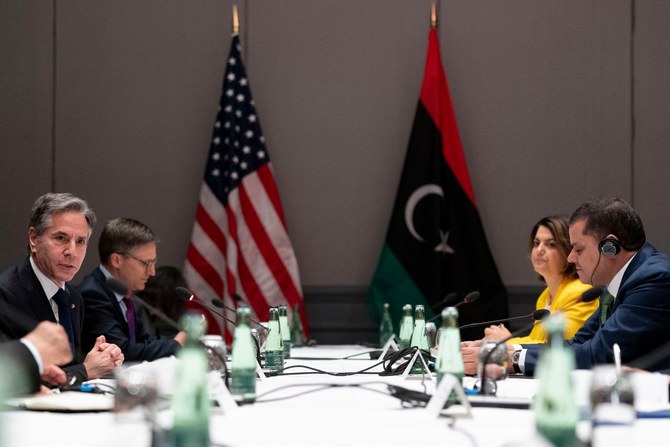
When Libya fell into chaos in 2011, France decided to involve NATO. Paris thought the international community had the responsibility to protect the Libyan people from its leader Muammar Qaddafi.
After the operation started, then-Turkish Prime Minister Recep Tayyip Erdogan’s first reaction was “What is NATO’s business in Libya?”
But as the popular uprising spread in the country, Turkey thought that if it did not intervene in the conflict, $27 billion of contracts of Turkish companies operating in Libya may be exposed to risks, so it decided to cooperate with NATO. It did not take part in the airstrikes, but concurred with the decision to impose a no-fly zone and arms embargo. It sent five battleships to contribute to operations.
In the subsequent years, Turkey remained involved in the crisis, but on the opposite side of the international community.
There are, at present, three competing governments in Libya.
One is the UN-backed Government of National Accord (GNA), based in Tripoli. It controls an area that corresponds roughly to 6 percent of Libya’s territory. The government is controlled by the Muslim Brotherhood-inclined members of parliament. This government is supported by Turkey, Qatar and the EU — with the exception of France and Italy.
The rival government, House of Representatives, is formed by MPs who disagreed with the Muslim Brotherhood and moved to Tobruk. General Khalifa Haftar supports the Tobruk government and a few months ago ordered his troops to seize Tripoli.
The Tripoli government displayed an unexpectedly stiff resistance to Haftar’s attack and is still holding. Saudi Arabia, Egypt, Jordan and the UAE militarily support this government. France extends political support to it while the US looks hesitant. The Tobruk government controls three quarters of Libya’s territory.
The third party in the Libyan crisis is a relatively weak authority, composed of various southern Arab and Tebu tribes with extensions in Tchad, Mali and Sudan, but controls 18 percent of Libya’s territory. The region is rich in oil and other minerals, but at present the main income accrues from limited trade with the neighboring countries and from smuggling.
Turkey-Libya relations returned to the agenda of international relations when two weeks ago Turkey and Libya signed two memoranda of understanding with the GNA. One was for the delineation of their Exclusive Economic Zones (EEZ), the other for security and military cooperation. Erdogan recently said that if the Libyan government makes a formal request, Turkey might send troops to Libya.
If Turkey also deploys a sizeable force in Libya to protect the Tripoli government, this may change several paradigms in Syria, Libya and in Turkish-Russian relations
Yasar Yakis
A critical question is what will happen to the memoranda if Haftar seizes Tripoli and eliminates the government. Will he abrogate the memorandum — especially the one on the EEZ — because it was signed by the government that he fought, or will he maintain it because it makes available to the government vast sea area for exploration?
A similar question arises for Egypt. The Turkey-Libya accord also enlarges the Egyptian EEZ, but it is unclear whether Cairo will stick to the agreement that it signed with Greece, Greek Cypriots and Israel.
There was a standstill for months between the forces of the Tripoli government and Haftar army. But the situation may now change because, according to The New York Times, Russia, in early November, sent regular army troops to Libya, complete with Sukhoi jets, coordinated missile strikes, precision-guided artillery and snipers. These are in addition to the Russian Wagner Group mercenaries that are fighting on Haftar’s side.
If Turkey also deploys a sizeable force in Libya to protect the Tripoli government, this may change several paradigms in Syria, Libya and in Turkish-Russian relations.
Both Ankara and Moscow will likely do their best to avoid any sort of deterioration of relations between them. Libya is important for Russia, but driving a wedge in NATO by closely cooperating with Turkey is also important.
If the relations between Turkey and Russia deteriorate as a result of a confrontation in Libya, the process in the Syrian crisis may change its course and Turkey’s plans in Syria may run into difficulty in addition to the souring Turkish-Russian relations at large.
• Yasar Yakis is a former foreign minister of Turkey and founding member of the ruling AK Party. Twitter: @yakis_yasar
Disclaimer: Views expressed by writers in this section are their own and do not necessarily reflect Arab News" point-of-view












